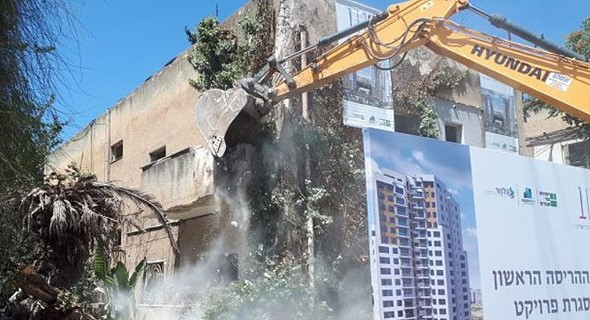Calcalist, Amitai Gazit and Omri Milman, 08.10.20
A reform designed to encourage urban renewal in evacuation-construction projects through budgets to be transferred to local authorities and an increase in the improvement levies that the authorities will collect will enter into a package of laws that the Ministry of Finance is currently formulating as a replacement for the Arrangements Law.
If this package of laws is promoted, it will be without a state budget in a way that will make it possible to advance some reforms without giving up the threat of dissolving the government around approving the state budget in the Knesset.
The idea of Finance Minister Israel Katz to promote a package of laws came up a few weeks ago, but according to sources in the Treasury, not much has been done since. Now the offer comes up again.
The intention is to take some laws from the draft Arrangements Law published by the Finance Ministry in June, when Prime Minister Benjamin Netanyahu and Minister Katz tried to move a budget for the few months remaining until the end of 2020 instead of a biennial budget as stipulated in the coalition agreement. The rules in the limited package are those that appreciate that it is easy to promote them.
The one who could thwart Katz's attempt to make a mark on the Israeli economy is the replacement Prime Minister Bnei Gantz. Because the attempt of the Minister of Finance to formulate a limited arrangement law without a state budget is an announcement that he does not intend to approve the budget. Although a few weeks ago, Katz said that he would soon start working in his office on the 2021 budget, but in practice this has not yet happened, and in any case, without Netanyahu's approval, there will be no budget. So it is not at all certain that blue and white will allow Katz to formulate the same kind of law of arrangements just before Netanyahu announces further elections without rotation.
Improvement levy in evacuation-construction projects
The reform in the field of urban renewal that will be included in the package of laws includes several moves designed to create certainty that will make it possible to promote evacuation-construction projects. One of the main barriers is the opposition of local authorities to programs that create a burden on infrastructure, but do not generate income for them that will allow the infrastructure to be renewed and adapted to the increase in the number of residents. The source of the budget for infrastructure development is the improvement levies, but usually in evacuation-construction and projects of TMA 38 there is an exemption from the improvement levy.
 Evacuation-construction (archive) Photo: Dan Shoshani PR
Evacuation-construction (archive) Photo: Dan Shoshani PR
The new legislation stipulates a default according to which an improvement levy on evacuation-construction projects will be at the rate of 25% of the value of the additional construction. But local authorities will be able to mark areas where there will be improvement levies at a different rate according to 3 steps and depending on the expected profitability in each area: exemption from levy, 25% or 50%. In addition, in cases where the municipality approves a high density of housing units, it will be able to charge a certain share of the new building rights for a 66% improvement levy. This mechanism is intended to generate an incentive to cram the number of apartments and to generate a budgetary source for improving infrastructure.
An additional incentive for municipalities will be in the form of framework agreements, which they will be able to define with the Authority for Urban Renewal. On the one hand, they will have to commit to approving plans to build 4,000 apartments in urban renewal within 5 years, at a rate of at least 800 apartments a year.
On the other hand, they will receive a financial incentive from the Authority of approximately NIS 30,000-20,000 for each new housing unit for the purpose of establishing residential-supporting infrastructure such as roads, sewers, public institutions and education.
The budgetary source for these agreements is the Urban Renewal Fund to which the Israel Land Authority flows money in accordance with an agreement with the Ministry of Construction and the Ministry of Finance. The amount the fund has accumulated and its annual budget have not yet been finalized.
Reform in its procedures Urban renewal is essential because the state is having difficulty promoting construction in the heart of the demand areas in Tel Aviv and Gush Dan. The strategic housing plan approved in 2017 and defines planning objectives in accordance with the population growth forecast stipulated that by 2025 and in each of the years 50% of the apartments in plans approved in the Tel Aviv area will be under urban renewal procedures, and 30% of the apartments in plans approved in the central area. Today we are very far from the target, in 2019 less than 20% of the apartments in software approved across the country were in the process of urban renewal, and only 6% of the building permits were for urban renewal plans.



